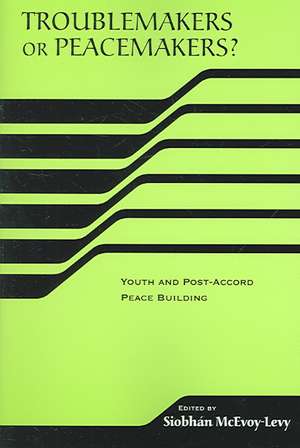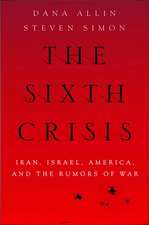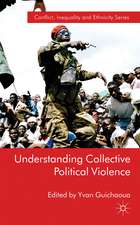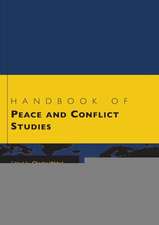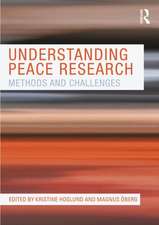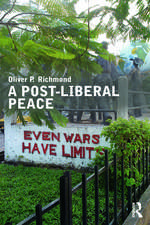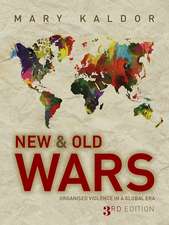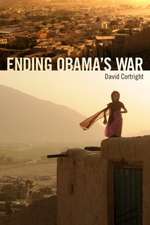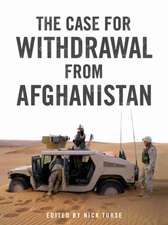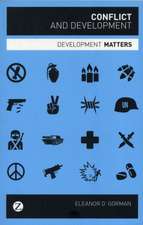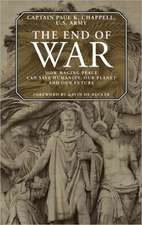Troublemakers or Peacemakers? – Youth and Post–Accord Peace Building: RIREC Project on Post-Accord Peacebuilding
Autor Siobhan Mcevoy–levyen Limba Engleză Paperback – 5 mar 2006
| Toate formatele și edițiile | Preț | Express |
|---|---|---|
| Paperback (1) | 252.07 lei 6-8 săpt. | |
| MR – University of Notre Dame Press – 5 mar 2006 | 252.07 lei 6-8 săpt. | |
| Hardback (1) | 694.98 lei 6-8 săpt. | |
| MR – University of Notre Dame Press – 5 mar 2006 | 694.98 lei 6-8 săpt. |
Preț: 252.07 lei
Nou
Puncte Express: 378
Preț estimativ în valută:
48.23€ • 50.36$ • 39.92£
48.23€ • 50.36$ • 39.92£
Carte tipărită la comandă
Livrare economică 04-18 aprilie
Preluare comenzi: 021 569.72.76
Specificații
ISBN-13: 9780268034948
ISBN-10: 026803494X
Pagini: 352
Dimensiuni: 152 x 229 x 18 mm
Greutate: 0.46 kg
Ediția:1
Editura: MR – University of Notre Dame Press
Seria RIREC Project on Post-Accord Peacebuilding
ISBN-10: 026803494X
Pagini: 352
Dimensiuni: 152 x 229 x 18 mm
Greutate: 0.46 kg
Ediția:1
Editura: MR – University of Notre Dame Press
Seria RIREC Project on Post-Accord Peacebuilding
Notă biografică
Siobhán McEvoy-Levy is assistant professor of political science at Butler University.
Contributors: Siobhán McEvoy-Levy, Michael Wessells, Davidson Jonah, Victoria Sanford, Marc Sommers, Carolyn Nordstrom, Ed Cairns, Frances McLernon, Wendy Moore, Ilse Hakvoort, Jaco Cilliers, Jeff Helsing, Namik Kirlic, Neil McMaster, Nir Sonnenschein, Sami Adwan, Dan Bar-On, Jessica Senehi, Sean Byrne, and Johan Galtung.
Contributors: Siobhán McEvoy-Levy, Michael Wessells, Davidson Jonah, Victoria Sanford, Marc Sommers, Carolyn Nordstrom, Ed Cairns, Frances McLernon, Wendy Moore, Ilse Hakvoort, Jaco Cilliers, Jeff Helsing, Namik Kirlic, Neil McMaster, Nir Sonnenschein, Sami Adwan, Dan Bar-On, Jessica Senehi, Sean Byrne, and Johan Galtung.
Descriere
Exploring the contributions of youth and their multidimensional roles as political activists, soldiers, economic actors, peace activists, and community-builders, this volume assigns importance to the political agency of children and youth in war zones. It is useful for anyone interested in conflict resolution and the peace building process.
Recenzii
“This is an excellent compendium of research on largely micro-efforts at peace building aimed at youth, set in the context of country conflicts that remained violent and unjust after the conclusion of peace accords. The articles provide the context of conflicts in Guatemala, Colombia, Rwanda, Angola, Northern Ireland, Bosnia, Palestine, and Israel. A few provocative thematic essays summarize the state of the literature on peace building, introducing the book's important and under-studied focus on youth, and arguing that youth can make or break sustainable peace efforts.” —Political Science Quarterly, Summer 2007
